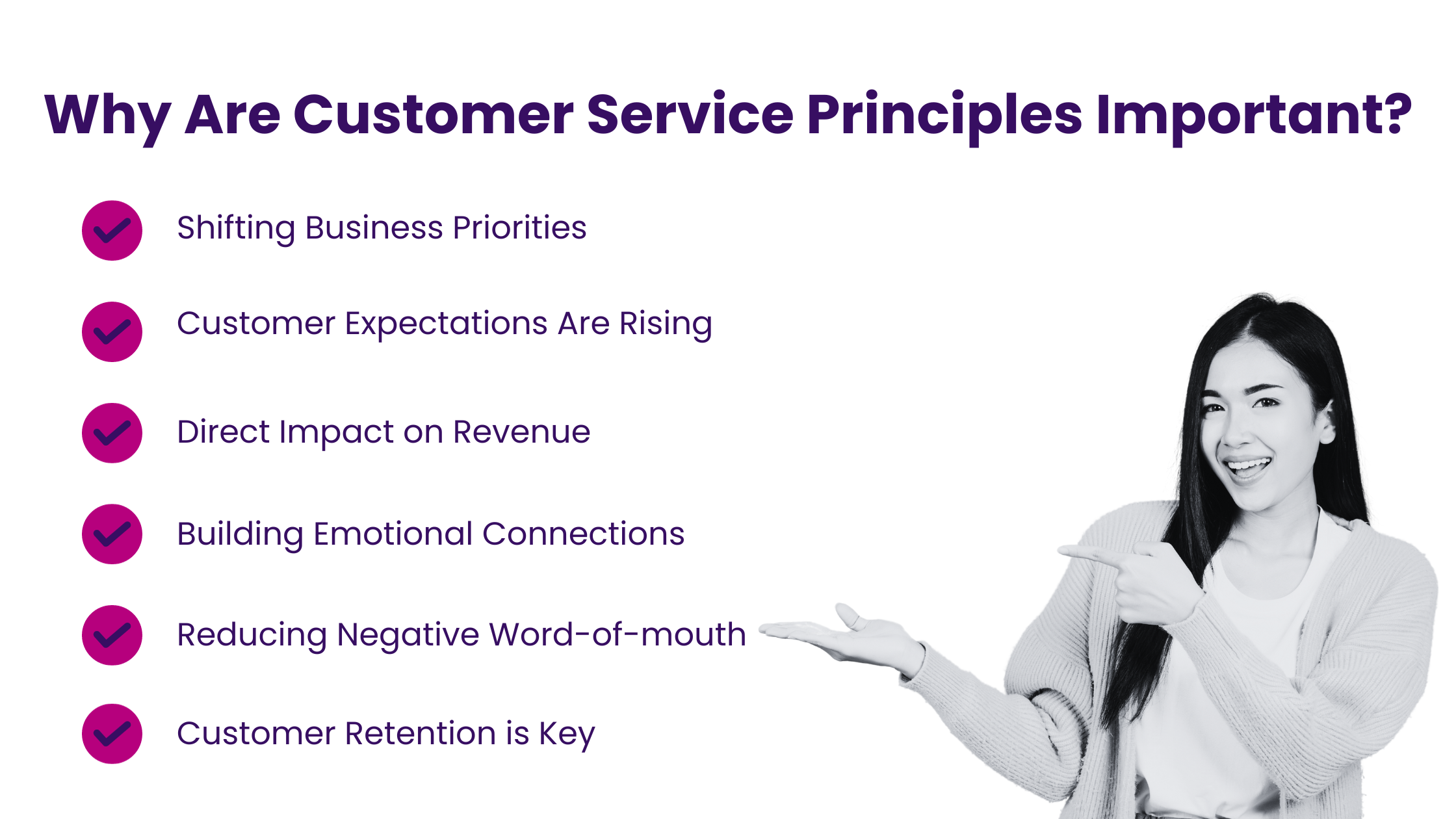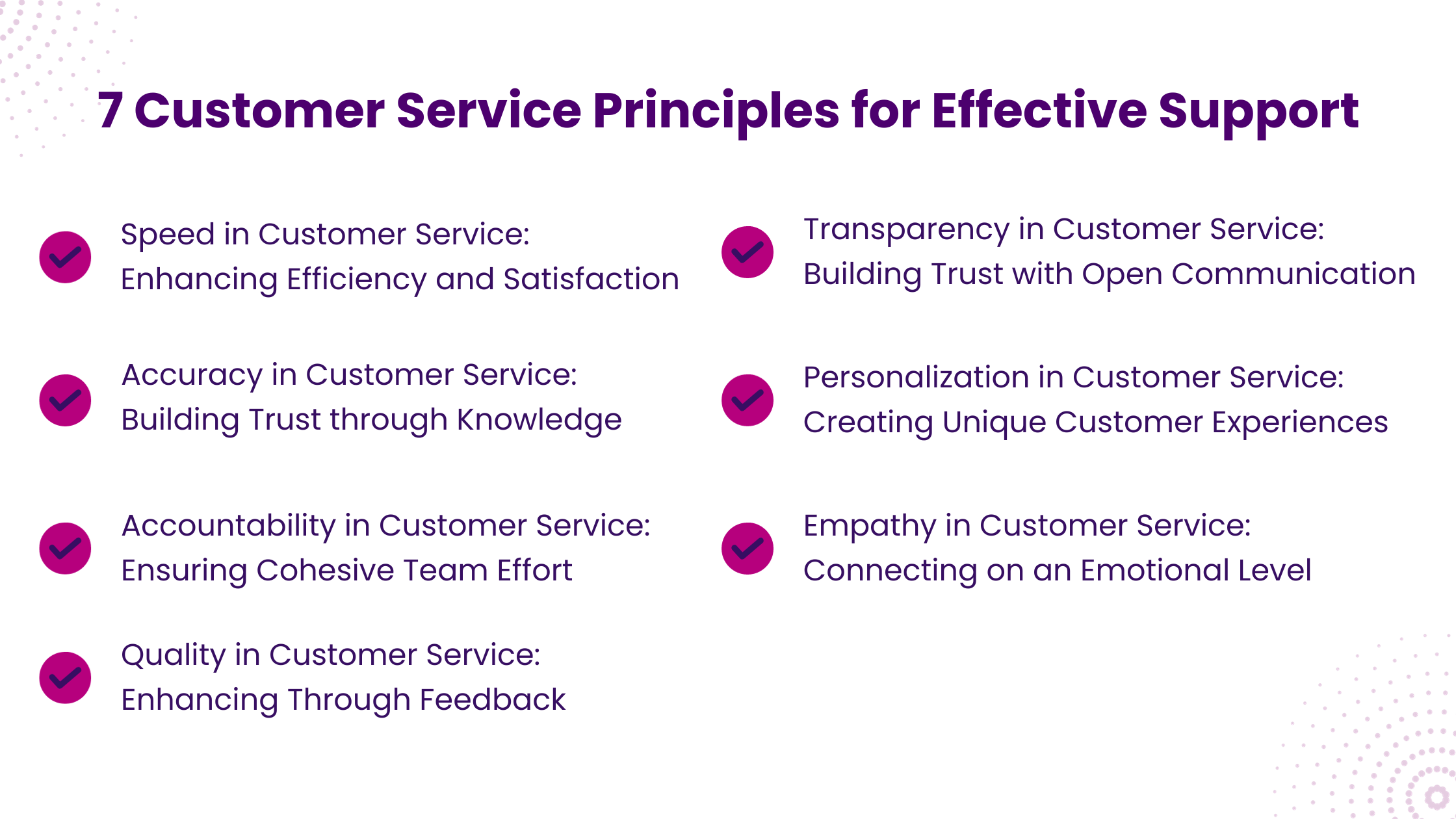Think about a time when poor customer service might have driven you to switch service providers. Maybe a telecom company failed to respond promptly to your queries. What led to that switch? You were likely seeking responsiveness, understanding, and efficiency, all hallmarks of excellent customer service.
Notably, 86% of customers are willing to pay more for better customer service. This places immense pressure on businesses to consistently meet and exceed customer expectations. The key to achieving this lies in customer service principles.
So, let’s embark on this journey to understand and implement these customer service principles, empowering your team to boost customer satisfaction, foster loyalty, and positively impact your business’s bottom line.
Why Are Customer Service Principles Important?

Customer service has evolved from a mere cost center to a vital engine driving business success in the modern customer experience era. The importance of customer service principles in this transformation cannot be understated. These principles are the foundation for building customer loyalty, fostering brand advocacy, and securing long-term revenue growth.
- Shifting Business Priorities
Customer service is no longer just a support function but a key differentiator in business strategy. Companies now recognize that adhering to excellent customer service principles is a significant driver of brand loyalty and customer retention.
- Customer Expectations Are Rising
Customers today expect more than just a product or service; they seek a holistic experience. A Walker study predicts that by 2023, customer experience will overtake price and product as the key brand differentiator. This shift makes adopting robust customer service principles more crucial than ever.
- Direct Impact on Revenue
There’s a direct correlation between customer service and revenue growth. A study by the Temkin Group found that companies that earn $1 billion annually can expect to earn, on average, an additional $700 million within 3 years of investing in customer experience.
- Building Emotional Connections
Emotional connections matter in customer service. A study found that more than 50% of an experience is based on emotions, as emotions shape the attitudes that drive decisions and loyalty.
- Reducing Negative Word-of-mouth
Poor customer service can lead to negative word-of-mouth. According to a study by American Express, Americans tell an average of 15 people about a poor service experience versus the 11 people they’ll tell about a good experience.
- Customer Retention is Key
It’s well-known that retaining an existing customer is far more cost-effective than acquiring a new one. According to Lee Resources, developing a new customer is five times more expensive than retaining an existing customer.
In light of these facts, it’s clear that customer service principles are not just guidelines but essential tools for building a successful, customer-focused business. The following section will delve into the 7 fundamental principles of customer service excellence and provide actionable insights to integrate them effectively into your customer service strategy.
7 Customer Service Principles for Effective Support

Effective customer service can significantly influence customer loyalty, brand advocacy, and long-term revenue. To achieve this, it’s essential to understand and implement key customer service principles in your contact center.
1. Speed in Customer Service: Enhancing Efficiency and Satisfaction
Customers expect rapid responses across all communication channels in today’s fast-paced world. Whether it’s a phone call, email, or live chat, the speed at which a company responds can greatly impact customer satisfaction.
Implementing workflow automation can streamline the process of handling customer queries. Automation can help categorize, prioritize, and route queries to the appropriate team or individual, thereby reducing the response time.
- Automated Ticketing System: Using an automated system to generate and track support tickets ensures that no customer query goes unnoticed and is addressed promptly.
- Prioritization of Queries: Automation can help identify urgent queries and ensure they are addressed first, thus improving efficiency.
Service Level Agreements (SLAs) set the response and resolution times expectations. By strictly adhering to these agreements, companies can ensure consistency in their response times, which builds customer trust. Reviewing SLA compliance helps identify areas for improvement and ensures that the team consistently meets response time targets.
Utilizing technology like autoresponders and AI chatbots can significantly enhance the speed of customer service. Autoresponders can provide immediate acknowledgment to customers, informing them that their query has been received and will be addressed.
AI chatbots can handle basic queries instantly, providing quick solutions to customers and freeing human agents to deal with more complex issues.
Example in Practice
Consider a telecom company that has implemented these strategies. The company can address customer issues more quickly by reducing its response time through automated systems and AI chatbots. This efficiency improves customer satisfaction and reduces the likelihood of customers switching to competitors due to slow response times.
Benefits
Quick resolution of issues is key to customer retention. By addressing customer concerns promptly, businesses can significantly reduce churn rates. Satisfied customers are less likely to look for alternatives and more likely to remain loyal to the brand.
It’s important for businesses to assess and improve their response times continually. Gathering feedback from customers about their experience with the support process can provide valuable insights for further enhancements.
2. Accuracy in Customer Service: Building Trust through Knowledge
The foundation of accuracy in customer service is in-depth knowledge of your products or services. This ensures that support staff can provide correct and helpful information to customers.
Conducting frequent training sessions keeps the support team updated on product features, updates, and common customer issues. Implementing role-play scenarios during training can help staff practice handling various customer queries, enhancing their ability to provide accurate information under different circumstances.
Video tutorials are an effective tool for training. They can visually demonstrate product features and common troubleshooting steps, making it easier for support staff to understand and relay this information to customers.
An up-to-date internal knowledge base is a valuable resource for support teams.
- Centralized Information Source: It serves as a centralized source of information, allowing team members to find accurate answers to customer queries quickly.
- Regular Updates: Keeping the knowledge base updated with the latest product information, FAQs, and troubleshooting guides is crucial for maintaining accuracy.
Benefits
Providing accurate information is key to building and maintaining customer trust. In retail, for example, accurate product information and troubleshooting advice can significantly enhance customer satisfaction and loyalty.
3. Accountability in Customer Service: Ensuring Cohesive Team Effort
Customer service excellence requires the involvement and accountability of all departments, not just the support team. Encouraging collaboration between departments such as sales, product development, and support ensures a unified approach to customer service. Making every department accountable for customer satisfaction helps create a customer-centric culture.
Establishing clear and achievable customer service goals is essential for maintaining high service standards. Setting goals based on industry benchmarks and customer expectations can guide teams in delivering high-quality service. Continuously reviewing and adjusting these goals ensures they remain relevant and challenging.
Example in Practice
In the software industry, when development, sales, and support teams align their understanding of customer needs and service standards, it leads to a more effective and cohesive customer support experience.
Benefits
When all teams are accountable for customer service, it leads to a more consistent and high-quality customer experience. This holistic approach ensures that customer needs are understood and met at every touchpoint, enhancing overall satisfaction.
4. Quality in Customer Service: Enhancing Through Feedback
Customer feedback is a critical tool for assessing and improving the quality of service. It provides direct insights into customer satisfaction and areas needing improvement. Implementing regular surveys helps gather feedback on various aspects of service, from product satisfaction to customer support effectiveness.
Offering multiple channels for feedback, such as email surveys, website feedback forms, or direct calls, ensures that customers can easily share their experiences. Actively responding to and implementing feedback is crucial in demonstrating to customers that their opinions are valued and acted upon.
Whether positive or negative, responding to customer feedback shows customers that their voice is heard. Making changes based on customer feedback can lead to continuous improvement in service quality.
Example in Practice
A restaurant chain that regularly collects and analyzes customer feedback can adjust its menu, service style, or ambiance, improving customer satisfaction and repeat business.
Benefits
As reflected in customer feedback, quality service can significantly impact customer loyalty. Satisfied customers are more likely to return and recommend the business to others.
5. Transparency in Customer Service: Building Trust through Open Communication
Transparency in communication is key to building and maintaining customer trust, especially when issues arise. Informing customers proactively about issues such as service downtimes, delays, or policy changes helps manage their expectations. Ensuring all communication is clear, concise, and jargon-free helps avoid misunderstandings and frustration.
Being transparent, especially in challenging situations, can turn a negative experience into an opportunity to build trust. Acknowledging and apologizing for mistakes and then taking steps to rectify them demonstrates a commitment to integrity and customer satisfaction. Regular updates during ongoing issues keep customers informed and reduce uncertainty.
Example in Practice
Online services that promptly notify customers about maintenance or outages and provide regular updates can maintain customer trust even during service interruptions.
Benefits
Transparent customer service practices lead to stronger customer relationships. Customers who trust a company are likelier to remain loyal and have a higher tolerance for occasional issues.
6. Personalization in Customer Service: Creating Unique Customer Experiences
Personalization in customer service involves recognizing and addressing each customer’s unique needs and preferences. This approach makes customers feel valued and understood.
Collecting and analyzing purchase history, preferences, and past interactions can provide insights into individual customer needs. This information can significantly enhance the customer experience by offering tailored solutions or recommendations.
Advanced technologies like CRM systems and AI can help deliver personalized experiences at scale.
- CRM Systems: These systems can store detailed customer profiles, enabling customer service representatives to access personalized information during interactions.
- AI and Machine Learning: These technologies can analyze customer data to predict needs and preferences, allowing for more targeted and relevant interactions.
Example in Practice
Personalizing advice and solutions based on individual customer profiles can increase customer satisfaction and loyalty in the financial services sector. For example, a bank that offers personalized investment advice based on a customer’s financial history and goals is more likely to retain that customer.
Benefits
Personalized customer service can lead to deeper customer relationships and loyalty. Customers are likelier to stay with a brand that understands their needs and provides relevant solutions.
7. Empathy in Customer Service: Connecting on an Emotional Level
Empathy involves understanding and sharing the feelings of others. In customer service, this means recognizing the emotional state of the customer and responding appropriately. Providing training in emotional intelligence to customer service representatives can help them better understand and respond to customer emotions.
Encouraging active listening helps representatives understand not just the words of the customer but also the emotions behind them. Showing empathy can build trust and rapport with customers, leading to more positive interactions and resolutions.
Validating a customer’s feelings can make them feel heard and respected, which is especially important in resolving conflicts or complaints. Adjusting the tone and approach based on the customer’s emotional state can lead to more effective communication and problem-solving.
Example in Practice
In healthcare, providers offering empathetic support to patients and their families can significantly enhance satisfaction and trust. For instance, a nurse who takes the time to listen and respond compassionately to a patient’s concerns can greatly improve the patient’s experience.
Benefits
Empathetic customer service can lead to stronger customer relationships. Customers are likelier to remain loyal to a brand that demonstrates understanding and care for their emotional well-being.
The integration and application of these 7 customer service principles are fundamental to the success of any customer-centric business. These principles are not just strategies but integral to building strong, lasting customer relationships. They are the pillars upon which customer trust, loyalty, and satisfaction are built.
As businesses navigate the evolving landscape of customer expectations, adhering to these customer service principles will be crucial in maintaining a competitive edge and achieving sustainable growth.
Remember, exceptional customer service is not just about meeting needs; it’s about exceeding expectations and creating memorable experiences that resonate with customers long after interacting with your brand.
Unlock Customer Service Excellence with INSIDEA’s Expertise!
 Are you ready to transform your customer service and take your customer experience to the next level? INSIDEA is here to guide you through every step of the way, ensuring that your support team is empowered to deliver exceptional service.
Are you ready to transform your customer service and take your customer experience to the next level? INSIDEA is here to guide you through every step of the way, ensuring that your support team is empowered to deliver exceptional service.
As experts in customer support solutions, we pride ourselves on helping businesses optimize their support strategies for maximum efficiency and customer satisfaction. Reach out today to discover how INSIDEA can revolutionize your customer support and contribute to your business success!
Tailored Support Strategies: At INSIDEA, we understand that every business is unique. That’s why we work closely with you to develop customized support strategies that align with your specific needs and goals.
Industry Expertise: Our team brings a wealth of experience and industry knowledge to the table, ensuring that you have access to the best practices and insights in customer support.
Customer Commitment : Your customers’ happiness is our top priority. We are dedicated to helping you exceed their expectations and foster long-lasting relationships.
Ready to elevate your customer support experience? Book a meeting with our experts today and start your journey towards outstanding customer service and satisfaction.








































